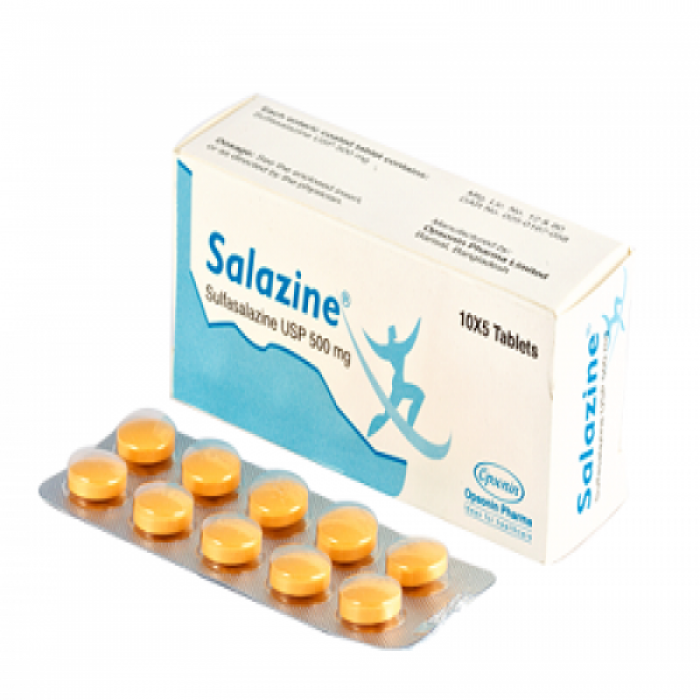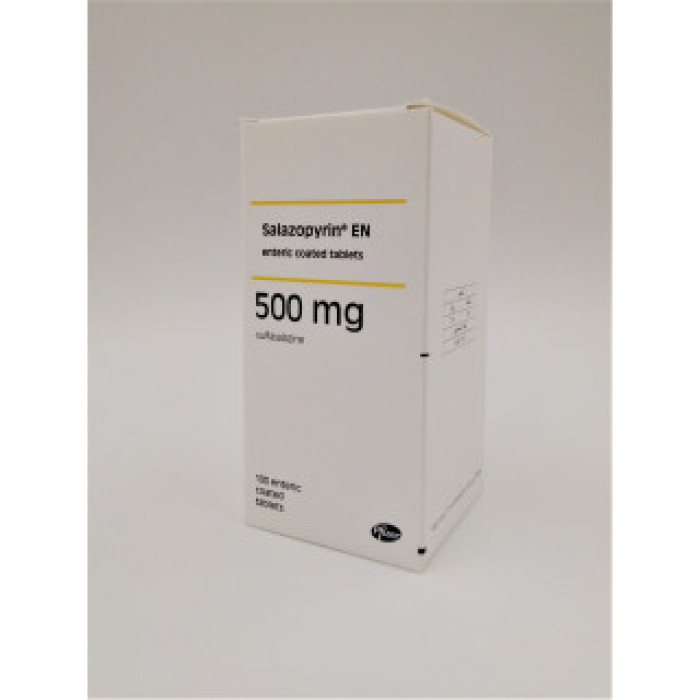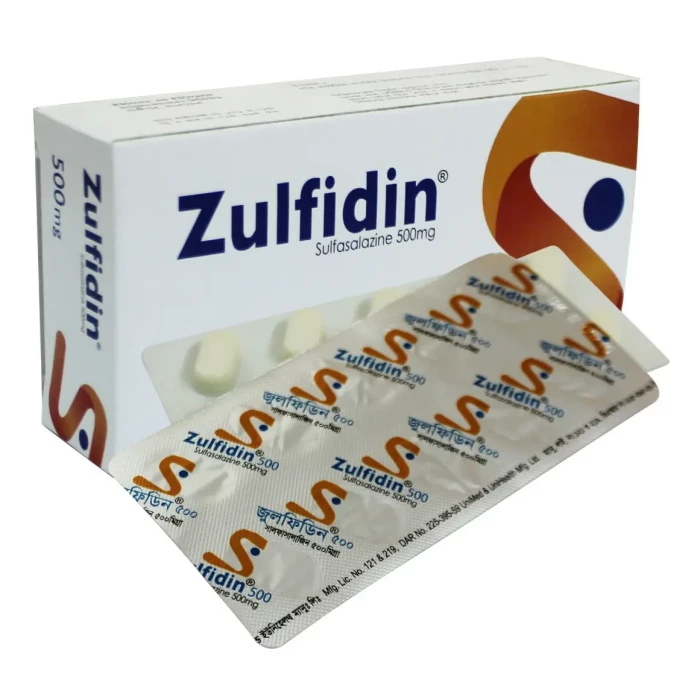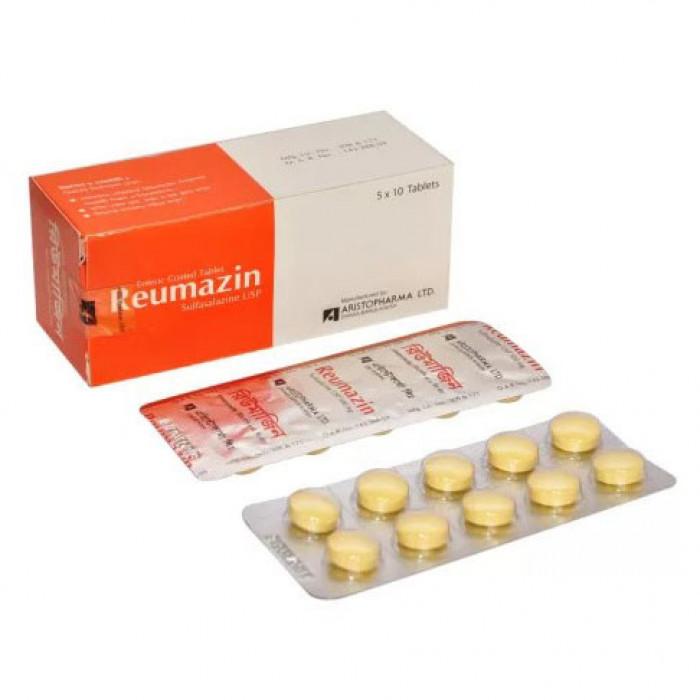
✔ 100% Authentic Product
👁️ Currently Viewing 4504
Salazine 500mg Tablet contains Sulfasalazine and is used to treat inflammatory bowel diseases such as ulcerative colitis and Crohn's disease. It is also used in the treatment of Rheumatoid Arthritis.
Discount
Price: ৳ 49
MRP:
৳
52.5
6%
Off

100% Genuine Products, Guaranteed

Safe & Secure Payments, Always

Fast, Secure & Efficient Delivery

Proper Packaging
 Cash on Delivery - All over Bangladesh
Cash on Delivery - All over Bangladesh Regular Delivery - 12-24 Hours, Dhaka City* Charge Tk.39-59
Regular Delivery - 12-24 Hours, Dhaka City* Charge Tk.39-59 Regular Delivery - 24-48 Hours, Other Cities* Charge Tk.99-110
Regular Delivery - 24-48 Hours, Other Cities* Charge Tk.99-110
 ফ্রি ডেলিভারিঃ - ৯৯৯ টাকা+ অর্ডারে, ঢাকা
শহরে
ফ্রি ডেলিভারিঃ - ৯৯৯ টাকা+ অর্ডারে, ঢাকা
শহরে ফ্রি ডেলিভারিঃ - ২৯৯৯ টাকা+ অর্ডারে, ঢাকার
বাহিরে
ফ্রি ডেলিভারিঃ - ২৯৯৯ টাকা+ অর্ডারে, ঢাকার
বাহিরে
100% Genuine Products, Guaranteed
Safe & Secure Payments, Always
Fast, Secure & Efficient Delivery
Proper Packaging
 Cash on Delivery - All over Bangladesh
Cash on Delivery - All over Bangladesh Regular Delivery - 12-24 Hours, Dhaka City* Charge Tk.39-59
Regular Delivery - 12-24 Hours, Dhaka City* Charge Tk.39-59 Regular Delivery - 24-48 Hours, Other Cities* Charge Tk.99-110
Regular Delivery - 24-48 Hours, Other Cities* Charge Tk.99-110 ফ্রি ডেলিভারিঃ - ৯৯৯ টাকা+ অর্ডারে, ঢাকা
শহরে
ফ্রি ডেলিভারিঃ - ৯৯৯ টাকা+ অর্ডারে, ঢাকা
শহরে ফ্রি ডেলিভারিঃ - ২৯৯৯ টাকা+ অর্ডারে, ঢাকার
বাহিরে
ফ্রি ডেলিভারিঃ - ২৯৯৯ টাকা+ অর্ডারে, ঢাকার
বাহিরে
✅ Description:
Salazine 500mg Tablet contains the active ingredient Sulfasalazine, which belongs to the group of medicines called Aminosalicylates. It is primarily used to treat and manage inflammatory bowel diseases such as ulcerative colitis and Crohn's disease. Additionally, it can also be used in the treatment of rheumatoid arthritis.
Ulcerative colitis is an inflammatory disease that affects the large bowel (colon and back passage), resulting in inflammation and symptoms such as abdominal pain and diarrhea, which may contain blood and mucus.
Crohn's disease is an inflammatory disease that can affect any part of the digestive system, from the mouth to the anus, with the most common areas being the last part of the small bowel and the first part of the large bowel. Symptoms of Crohn's disease include abdominal pain and diarrhea, which may also be bloody.
When taking Salazine 500mg Tablet, your doctor may monitor your blood, kidney, and liver function through specific tests. It is important to drink enough fluids during treatment to avoid any kidney-related issues.
Before taking Salazine 500mg Tablet, it is crucial to inform your doctor about any existing medical conditions you may have, such as porphyria (a rare blood pigment disorder), jaundice, kidney or liver problems, blood disorders, glucose-6-phosphate dehydrogenase deficiency, history of recurring chronic infections, asthma, or arthritis.
If you are pregnant or breastfeeding, it is important to discuss this with your doctor before starting Salazine 500mg Tablet, as its use during pregnancy and breastfeeding may not be recommended. Salazine 500mg Tablet is generally not recommended for use in children below 2 years of age.
Safety Advices

Alcohol
UNSAFE
It is not recommended to consume alcohol while taking Salazine 500mg Tablet to avoid unpleasant side effects.

Pregnancy
CAUTION
Salazine 500mg Tablet is not recommended to be used in pregnancy unless necessary. Consult your doctor before taking this medicine.

Breastfeeding
CONSULT YOUR DOCTOR
Salazine 500mg Tablet is not recommended to be used in breastfeeding unless absolutely necessary as it can pass into the breastmilk and may harm your infant. Consult your doctor before taking this medicine.

Driving
CAUTION
Salazine 500mg Tablet is unlikely to affect your ability to drive or use machines.

Kidney
CONSULT YOUR DOCTOR
Salazine 500mg Tablet should be used with caution in patients with kidney disease. Consult your doctor before taking it.

Liver
CAUTION
Salazine 500mg Tablet should be used with caution in patients with liver disease. Consult your doctor before taking it.
✔️ Uses of Salazine 500mg Tablet
It is used to treat:
- Ulcerative Colitis
- Rheumatoid Arthritis
- Crohn's Disease
- Ankylosing spondylitis
- Psoriatic Arthritis
- Juvenile Idiopathic arthritis
✔️ How does Salazine 500mg Tablet work?
Salazine 500mg Tablet is a Disease Modifying Anti-Rheumatoid Drug (DMARD). It works by limiting the activity of the immune system and blocking the actions of substances that cause inflammation (swelling).
✔️ Side Effects of Salazine 500mg Tablet
- Joint pain
- Skin rash and itching
- Headache
- Increased sensitivity of the skin to sunlight
- Bleeding from nose
- Dark colored urine
- Sore throat
- Abdominal pain
- Weight loss
- Fever
- Loss of appetite
✔️ Quick Suggestions:
- Salazine 500mg Tablet is an anti-inflammatory medicine used in the treatment of inflammatory bowel disease and rheumatoid arthritis. This medicine has sulfasalazine as its main ingredient. It should not be used for treating any other condition unless specified by the doctor.
- Take this medicine in the exact dose and duration as recommended. Do not take more than the prescribed dose. It is recommended to take it with meals to avoid discomfort in the stomach.
- Drink plenty of water to prevent the occurrence of kidney stones or crystalloids.
- Use of this medicine is not recommended in children less than 2 years old and children suffering from juvenile rheumatoid arthritis.
- Inform your doctor if you are allergic to salicylates (aspirin), sulfonamides (sulfadiazine), or any other medicine. If you have asthma, blood enzyme deficiency, or problems with the kidney or liver.
- You may experience some side effects if used with other medicine like anti-diabetic medicines, methotrexate, digoxin, etc. It must be used with your doctor's advice.
- Vomiting, fever, headache, dizziness, heartburn, and pain in the stomach or joint can be seen as side effects of this medicine, if side effects bother you please consult your doctor.
- Before starting Salazine 500mg Tablet, inform your doctor if you are pregnant, planning on becoming pregnant, or breastfeeding. Also, inform your doctor about all your other medicines and your complete medical history.
✔️ Indication of Salazine 500mg Tablet
- Ulcerative Colitis
Ulcerative colitis is an Inflammatory Bowel Disease that causes inflammation( swelling and irritation) in your digestive tract. Salazine 500mg Tablet is used in the treatment of ulcerative colitis.
- Rheumatoid Arthritis
Rheumatoid arthritis is an auto-immune disorder (a condition where the body's immunity targets and harms the body itself) that causes pain, swelling, stiffness, and loss of function in your joints. Salazine 500mg Tablet is used for the treatment of rheumatoid arthritis.
- Crohn's Disease
Crohn's disease is an inflammatory bowel disease that affects the lining of the digestive tract. It causes abdominal pain, diarrhea, weight loss, and malnutrition. Salazine 500mg Tablet is used for the treatment of Crohn's disease.
✔️ Pharmacology
The exact mode of action of sulfasalazine is not fully understood, but it is believed to involve its anti-inflammatory and immunomodulatory properties. The following factors may contribute to its therapeutic effects:
Anti-inflammatory and immunomodulatory properties: Sulfasalazine has been observed to have anti-inflammatory effects, which may help reduce inflammation in conditions such as ulcerative colitis and rheumatoid arthritis. It is thought to modulate the immune system's response, potentially reducing immune-mediated inflammation.
Affinity for connective tissue: Sulfasalazine may have an affinity for connective tissue, which could contribute to its effectiveness in certain conditions that involve connective tissue inflammation, such as rheumatoid arthritis.
Concentration in serous fluids, liver, and intestinal walls: Autoradiographic studies in animals have shown that sulfasalazine reaches relatively high concentrations in serous fluids, the liver, and intestinal walls. This distribution may contribute to its therapeutic effects in targeting inflammation in these specific areas.
Role of 5-Aminosalicylic Acid (5-ASA): Sulfasalazine is composed of sulfapyridine and 5-ASA. Clinical trials using rectal administration of sulfasalazine, sulfapyridine, and 5-ASA in ulcerative colitis have suggested that the 5-ASA component may have the most therapeutic effect. 5-ASA is believed to exert anti-inflammatory actions within the gastrointestinal tract, contributing to the treatment of inflammatory bowel diseases.
It's important to note that while sulfasalazine's exact mode of action is not fully understood, its use has been supported by clinical evidence in the treatment of conditions such as ulcerative colitis and rheumatoid arthritis. However, the specific mechanisms by which it provides therapeutic benefits may vary among individuals and the conditions being treated.
✔️ Dosage & Administration of Salazine 500mg Tablet
- Crohn's disease (adults): The recommended dose is 500 mg orally 2 to 4 times a day with food. The dosage should be adjusted based on individual tolerance and response to treatment.
- Ulcerative colitis (pediatric, 6 years or older): The initial dose is 40 to 60 mg/kg/day orally, divided into 3 to 6 doses.
- Rheumatoid arthritis (adults): The recommended dose is 2 g daily in two evenly divided doses. It is advisable to initiate therapy with a lower dosage (e.g., 0.5 to 1.0 g daily) to reduce the risk of gastrointestinal intolerance. A suggested dosing schedule is provided, gradually increasing the dosage over several weeks.
- Rheumatoid arthritis (6 years or older): The initial dose is 10 mg/kg/day orally in 2 equally divided doses.
- Juvenile rheumatoid arthritis (polyarticular course, children 6 years or older): The recommended dose is 30 to 50 mg/kg/day orally, divided into two equally divided doses, with a maximum dose of 2 g per day.
For other indications:
- Initial therapy (adults): The recommended dose is 3 to 4 g daily, divided into multiple doses with intervals not exceeding eight hours. It may be advisable to initiate therapy with a lower dosage (1 to 2 g daily) to reduce the risk of gastrointestinal intolerance.
- Initial therapy (children 6 years or older): The recommended dose is 40 to 60 mg/kg/day, divided into 3 to 6 doses.
- Maintenance therapy (adults): The recommended dose is 2 g daily.
- Maintenance therapy (children 6 years or older): The recommended dose is 30 mg/kg/day, divided into 4 doses.
Take Salazine 500mg Tablet as advised by your physician. Swallow the medicine with water. Do not crush or chew the medicine. Your doctor will decide the right dose and duration depending on your age, body weight, and disease condition.
✔️ Interaction
Salazine 500mg Tablet may interact with various medications, including:
- Blood thinner (warfarin): Sulfasalazine may enhance the effects of blood thinners, increasing the risk of bleeding. Close monitoring of blood clotting parameters is necessary when using these medications together.
- Heart disease medicine (digoxin): Sulfasalazine may reduce the absorption of digoxin, leading to reduced effectiveness. Monitoring digoxin levels and adjusting the dosage may be necessary.
- Iron supplements (folate): Sulfasalazine may impair the absorption of folate, potentially leading to folate deficiency. Supplementation or monitoring of folate levels may be required.
- Anti-diabetic medicine (glimepiride, glyburide, glipizide): Sulfasalazine may affect blood glucose levels and interact with anti-diabetic medications. Close monitoring of blood sugar levels and potential adjustment of anti-diabetic medication may be necessary.
- Antibiotics (methenamine): Sulfasalazine may reduce the effectiveness of methenamine. Use caution when using these medications together.
- Immune system-affecting drugs (azathioprine, mercaptopurine): Sulfasalazine may interact with these medications, potentially increasing the risk of bone marrow suppression or other toxicities. Close monitoring is essential.
- Anti-arthritis or anti-cancer drug (methotrexate): Sulfasalazine may increase the toxicity of methotrexate. Close monitoring of blood counts and liver function is necessary.
- Anti-TB drug (isoniazid): Sulfasalazine may interfere with the effectiveness of isoniazid. Careful monitoring is required when using these medications together.
✔️ Contraindications
There are several contraindications for the use of Salazine 500mg Tablet in certain medical conditions, including colitis intestinal obstruction, urinary obstruction, hematologic toxicity, hypersensitivity or allergic reactions to sulfasalazine, liver disease, porphyria, and kidney disease. It is important to discuss your medical history and any existing conditions with your healthcare professional before initiating treatment.
✔️ Pregnancy & Lactation
Sulfasalazine is classified as Pregnancy Category B, which means that there may be a potential risk to the fetus, but the benefits of using the medication may outweigh the potential risks in certain situations. It should only be taken during pregnancy if it is determined to be absolutely necessary by a healthcare professional.
If sulfasalazine is used by a nursing mother, it should be done with caution. The medication may be excreted into breast milk, and there is a potential risk of adverse effects on the nursing infant. It is important to consult with a healthcare professional before taking sulfasalazine while breastfeeding to assess the potential risks and benefits.
During pregnancy and breastfeeding, the decision to use sulfasalazine should be made after considering the individual circumstances and discussing them with a healthcare professional. They can provide personalized advice and weigh the potential risks and benefits to both the mother and the baby.
✔️ Precautions & Warnings
- Salazine 500mg Tablet 10's treatment is generally considered safe during pregnancy, but it is important to discuss its usage with your doctor, especially if you are planning for pregnancy. However, it should be avoided in breastfeeding mothers as it can pass into breast milk and cause jaundice and brain problems in infants less than 2 years of age.
- Inform your doctor if you have an allergy to any other sulfa drugs (sulfonamide antibiotics) as this may increase the risk of serious skin allergies such as urticaria and Stevens-Johnson syndrome.
- In men, the intake of Salazine 500mg Tablet 10's may temporarily lower sperm count, but it typically improves after stopping the medication.
- If you have asthma, wheezing, fever, breathing difficulties, sudden severe skin rash, unusual bleeding, sore throat, fever, unexplained bruising, or any other symptoms of infection, inform your doctor promptly.
- Salazine 500mg Tablet 10's may cause a change in the color of your urine, contact lenses, and tears to yellow/orange. It can also make your skin more sensitive to sunlight. These effects are normal, harmless, and not a cause for concern.
During pregnancy, your folic acid levels may be lower while taking Salazine 500mg Tablet 10's. Your doctor may prescribe you iron or folic acid supplements to compensate for this.
✔️ Storage Conditions
Store Salazine 500mg Tablet in a cool and dry place, protected from direct sunlight, moisture, and heat. Keep it away from children and pets. Do not use expired medicines. Discard any unused medicine properly, do not flush it in the toilet or throw it into the drain.
⚠️Disclaimer:
At ePharma, we’re committed to providing accurate and accessible health information. However, all content is intended for informational purposes only and should not replace medical advice from a qualified physician. Please consult your healthcare provider for personalized guidance. We aim to support, not substitute, the doctor-patient relationship.











